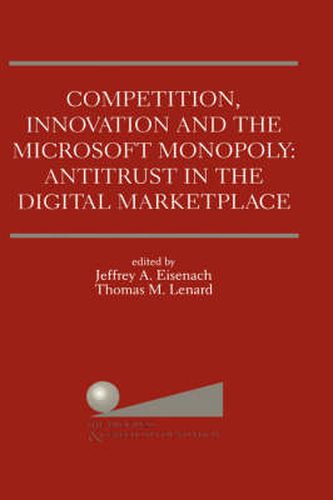Readings Newsletter
Become a Readings Member to make your shopping experience even easier.
Sign in or sign up for free!
You’re not far away from qualifying for FREE standard shipping within Australia
You’ve qualified for FREE standard shipping within Australia
The cart is loading…






This title is printed to order. This book may have been self-published. If so, we cannot guarantee the quality of the content. In the main most books will have gone through the editing process however some may not. We therefore suggest that you be aware of this before ordering this book. If in doubt check either the author or publisher’s details as we are unable to accept any returns unless they are faulty. Please contact us if you have any questions.
America’s antitrust laws were born out of the Industrial Revolution. Opponents of the antitrust laws argue that whatever merit the antitrust laws may have had in the past they have no place in a digital economy. Rapid innovation makes the accumulation of market power practically impossible. Markets change too quickly for antitrust actions to keep up. And antitrust remedies are inevitably regulatory and hence threaten to regulate business . A different view - and, generally, the view presented in this volume - is that antitrust law can and does have an important and constructive role to play in the digital economy. The software business is new, it is complex, and it is rapidly moving. Analysis of market definition, contestibility and potential competition, the role of innovation, network externalities, cost structures and marketing channels presents challenges for academics, policymakers and judges alike. Evaluating consumer harm is problematic. Distinguishing between illegal conduct and brutal - but legitimate - competition is often difficult. Is antitrust analysis up to the challenge? This volume suggests that antitrust analysis still works. In contrast to the political rhetoric that has surrounded much of the debate over the Microsoft case, the articles presented here suggest neither that Microsoft is inherently bad, nor that it deserves a de facto exemption from the antitrust laws. Instead, they offer insights for policymakers, courts, practitioners, professors and students of antitrust policy everywhere - on how antitrust analysis can be applied to the business of making and marketing computer software.
$9.00 standard shipping within Australia
FREE standard shipping within Australia for orders over $100.00
Express & International shipping calculated at checkout
This title is printed to order. This book may have been self-published. If so, we cannot guarantee the quality of the content. In the main most books will have gone through the editing process however some may not. We therefore suggest that you be aware of this before ordering this book. If in doubt check either the author or publisher’s details as we are unable to accept any returns unless they are faulty. Please contact us if you have any questions.
America’s antitrust laws were born out of the Industrial Revolution. Opponents of the antitrust laws argue that whatever merit the antitrust laws may have had in the past they have no place in a digital economy. Rapid innovation makes the accumulation of market power practically impossible. Markets change too quickly for antitrust actions to keep up. And antitrust remedies are inevitably regulatory and hence threaten to regulate business . A different view - and, generally, the view presented in this volume - is that antitrust law can and does have an important and constructive role to play in the digital economy. The software business is new, it is complex, and it is rapidly moving. Analysis of market definition, contestibility and potential competition, the role of innovation, network externalities, cost structures and marketing channels presents challenges for academics, policymakers and judges alike. Evaluating consumer harm is problematic. Distinguishing between illegal conduct and brutal - but legitimate - competition is often difficult. Is antitrust analysis up to the challenge? This volume suggests that antitrust analysis still works. In contrast to the political rhetoric that has surrounded much of the debate over the Microsoft case, the articles presented here suggest neither that Microsoft is inherently bad, nor that it deserves a de facto exemption from the antitrust laws. Instead, they offer insights for policymakers, courts, practitioners, professors and students of antitrust policy everywhere - on how antitrust analysis can be applied to the business of making and marketing computer software.